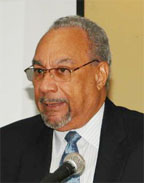-Brussels source
As Guyana prepares to hold a series of national focus groups consultations on the Economic Partnership Agreement (EPA) that Cariforum countries are scheduled to seal with the European Union in the near future there are signals that there may be a deferral of the signing.

Stabroek News has learnt that even as Cariforum, which comprises the Dominican Republic and Caricom, and the European Union are moving towards the September 2 signing of the EPA in Brussels, Belgium where the EU Parliament is located, there are indications that it might be postponed to later in the year or even next year.
One Brussels source has told Stabroek News that the timelines for the signature of the EPA with Cariforum countries as well as interim EPAs with African and Pacific countries continue to slip due to EU requirements to translate the texts into 23 languages. It is expected that the EPA and the interim agreements would be signed in the autumn or they might even be signed early next year.
The source said there is also a strong view by some European Members of Parliament who feel that the European Parliament should not approve EPAs until ACP Parliaments have done so.
He said that any delay would benefit the region in reviewing the document as there now appears to be some concerns about its benefits or lack of benefits in the Caribbean. Even though there might be no changes made, the source said that those concerned would know what the region was getting into, something he was sure the majority were unaware of.
 Meanwhile, former head of the Caribbean Regional Negotiating Machinery (CRNM) and a former Guyana foreign affairs minister, Sir Shridath Ramphal has said that it was not too late for Caricom to pull out of the deal as the current CRNM head, Henry Gill has said that if one country does not sign the agreement it could hold up the entire process.
Meanwhile, former head of the Caribbean Regional Negotiating Machinery (CRNM) and a former Guyana foreign affairs minister, Sir Shridath Ramphal has said that it was not too late for Caricom to pull out of the deal as the current CRNM head, Henry Gill has said that if one country does not sign the agreement it could hold up the entire process.
Since the EPA was initialed following meetings between the negotiators in Montego Bay, Jamaica in October 2007 and then in Guyana in December 2007 when all the heads gave their approval to go ahead with the initialing of the documents, President Bharrat Jagdeo agreed with a group of Caribbean academics and civil society activists in calling for a review of the document.
At the July Caricom Heads of Government meeting in Antigua and Barbuda Jagdeo indicated his government’s intention not to sign the EPA until there was a national consultation on the issue.
Though no date has yet been set for the start of the national consultations, Minister of Foreign Trade and International Cooperation, Dr Henry Jeffrey said that that the national consultations the government will hold on the EPA will be based on focus groups. Though no date for the start of the consultations appeared to have been set, Jeffery thinks that because of the technical nature of the EPA it would be more informative in nature, “which would be a good thing for the nation.”
 Most Favoured Nation
Most Favoured Nation
However, he said, if Guyana does not sign the EPA, the country will be treated as a Most Favoured Nation (MFN) and would be subjected to the tariffs that go with being a MFN since the preferences it now enjoys on sugar and rice and other products would be done away with.
President Jagdeo has declared that he will not sign the EPA until he has held national consultations because it has the potential to decimate entire sectors of developing economies.
Yet the EPA might not be signed as scheduled on September 2, 2008 because as Stabroek News has learnt, the EC might not be ready with the document which is currently being translated into all of the national languages of the European Union before being tabled in the European Union Parliament and signed onto.
On July 12, 2008, GINA had reported Head of the Presidential Secretariat, Dr Roger Luncheon as saying that the national consultations would begin by the end of that month. The consultations are now set to proceed after Carifesta.
Asked when the consultations would begin given the scheduled time of signing, September 2, 2008, and who would lead the consultation, and who will be targeted, Jeffrey asked for time to answer some of the questions.
He said that experts from the Caribbean Regional Negotiating Machinery (CRNM) and the European Commission along with local experts from his ministry, which was part of the negotiating process, would be the facilitators. Because of the nature of the negotiations, he does not expect that the consultations would be of the community-type meetings but more in the nature of focus groups.
Asked whether the consultations which the government is now seeking indicated a failure on the part of the administration itself in not doing its duty by consulting the necessary stakeholders before the draft agreement was agreed to and initialed by the Cariforum countries, including Guyana, Jeffrey said that a number of consultations which targeted focus groups were held across the country, some of which he took part in.
Others, he said, were conducted by Guyana’s representative on the negotiating team of the Caribbean Regional Negotiating Machinery, Neville Totaram. Meetings and discussions were held with the various Chambers of Commerce in Berbice, Demerara, Essequibo and in the Rupununi on the EPA.
Jeffrey, staff of the Ministry of Foreign Trade and representatives of the business community, who were engaged in the discussions in Berbice and the Rupununi recalled that the “consultations” at the time were very limited since the business sector knew very little about the EPAs.
“The discussions were lopsided,” one prominent business leader who requested anonymity said, noting that even though there have been some discussions on the issue some things still remain vague. He said that the GBTI Business Forum, held on June 2, 2008 which focused on the Cariforum/European Union EPA, and at which time the President first indicated that he would most likely not sign the EPA unless it affects the country’s exports negatively, was probably the most informative session he has attended on the matter to date.
“I actually felt that there were benefits to be gained from the EPA. At least that was how it was put over by the people from the CRNM. I feel the government needs to be more specific in telling us where and how we would lose,” he said.
He added that one of the presenters, Lincoln Price, had noted some of the areas in which the local private sector could benefit, and said that it was attractive, suggesting niche marketing and citing Precision Woodworking in its export of value-added products and joint venture projects with European counterparts.
Holding up whole agreement
In the meantime, in an interaction via teleconferencing with the Caribbean media from Barbados on August 1, the CRNM Head, Henry Gill said that if a country does not sign, he was afraid that it would hold up the whole agreement because of the way in which the documentation has been prepared.
He said the way it has been prepared for approval by the European Council is by indicating who the signatories of the parties are on both sides.
“The signatories have been spelt out very clearly on the Cariforum side, just as they have been spelt out very clearly on the European side. So if there is a change in that, it means that the whole documentation has to be reverted to the European Council and that will take quite some time because you don’t convene it at the snap of the finger. So if I’m correct it means that this can hold up the entire process,” Gill said.
When asked by the regional media if the EPA could be renegotiated as being called for by some, Gill said that renegotiation would be “extremely complicated and virtually impossible.”
Guyana’s major exports
Stating that he believed Guyana would be among the signatories because its major exports, sugar rice, fisheries and forest products would be affected, he said, “I see no reason why Guyana will not sign because it is in the interest of all those industries to have EPA market access.”
Reacting to Sir Shridath’s comments that Caribbean countries have broken the solidarity that existed within the African, Caribbean and Pacific (ACP) states “who had stood by us in the bad days of Lomé and said we will sign up with the EU; now the EU is going around hitting these countries over their heads with the Caribbean signatures,” Gill said that the region has begun to assist some African regions in their trade deals. He added that the CRNM had already sent missions to those regions and others were scheduled to go later this year.
Gill said that contrary to reports that other regions have not signed trade agreements with the EU, he said they have in fact concluded their trade deals and have signed interim agreements which are being translated in the languages of the EU but have not completed the entire package that includes the development dimensions.
“The difference, however, is that we are the only ones to have concluded a full EPA. All the others concluded interims… It is not that they strategised that they were limiting themselves to an interim; it’s that they had not done the work to conclude a full EPA. We had done the work,” he said.
In his remarks to the Caribbean Media Corporation (CNC) recently Sir Shridath said that it was not too late for Caricom countries to pull out of the EPA, noting that there were precedents Caribbean countries could follow and that the Europeans themselves were now examining the flaws in the trade deal.
“The Europeans do it all the time; they initial, they pause, they review, they come back, they regroup, they re-argue. What has happened to us that we have lost that capacity to manoeuvre? Why are we playing the European game?” he asked.
According to the CMC he also accused Caribbean governments of caving in to pressure from Europe, even though they knew they were not getting a good deal. “Not a single Caribbean president or prime minister has put his hand on his heart and said this is good for me. They have all said we know this is not good enough but we don’t think we could have done better. It’s a bad agreement but it’s better than no agreement.”
Bad agreement
Warning about the implications for the Caribbean with the rest of the world, he said that “Any trade agreement we conclude after this with any country or group of countries in the context of free trade they will demand, and we cannot deny, similar treatment to Europe. So we are concluding an agreement with the world and we’re concluding a bad agreement with the world.”
And in Barbados, the Barbados Manufacturers’ Association (BMA) feels that the possible repercussions of the EPA could be so devastating that a referendum should be considered in order to fully ventilate the positions and for more stakeholders to be made fully aware of the potential impact of the EPA.
In a statement issued prior to a seminar which included representatives of sister organisations from Jamaica and Trinidad and Tobago on August 6, 2008 to review the document, the BMA called on the Barbadian Government to take a fresh look at the EPA.
The statement said that there is a wide body of opinions which identify several issues in the proposed agreement that will work against the best interests of the region’s productive sectors and very much in favour of European beneficiaries.
Supporting the recent views expressed by Jagdeo and others concerned that the proposed agreement would severely disadvantage the region, the BMA said that “Much has happened since the last quarter of 2007 to cause us to rethink this proposed agreement, and it is timely for the Caribbean nations to engage their populations with the prospective outcome of this proposed protocol.”
